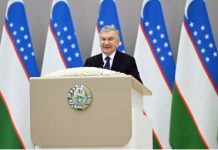KARACHI, Dec 17: The rise of Hindutva in India is transforming a society which was once based on secularism into a bigoted, divisive and narrow republic targeting non-Hindu minorities.
This was highlighted by Senator Mushahid Hussain during his talk on ‘Pakistan and Changing Regional Scenario: Challenges and Opportunities’ organised by the English Speaking Union of Pakistan (ESUP) at a local hotel on Friday evening.
Senator Hussain started off by saying that we are living in times of turbulence and transformation — a very historic period. Recently, he was struck by statements given by different world leaders. President Biden on Oct 12 said ‘this is going to be decisive decade’. President Putin on Oct 27 said ‘this is the most dangerous decade after the Second World War’. After that came the statement of President Xi Jinping referring to ‘once in a century changes’. Then an article appeared in Foreign Affairs by German Chancellor Olaf Scholz where he talked about a ‘historic turning point’.
Before expanding on the changes, Senator Hussain went down memory lane to shed light on the vision of the founding fathers of Pakistan. Allama Iqbal, 90 years ago, wrote mashriq se ubharte huay suraj ko zara dekh (see the sun rising in the East) and about the rise of China. Quaid-i-Azam Mohammad Ali Jinnah in his first interview with a foreign journalist on Jan 5, 1948 said, ‘Pakistan is the pivot of the world placed on the frontier on which the future of geopolitics of the world revolves.’ When Quaid-i-Millat Liaquat Ali Khan went on his famous visit to the US, a compendium of his speeches was titled Pakistan, the Heart of Asia. “So the vision of Pakistan was not confined to just one area, it was a larger vision.”
Says national security can no longer be measured in terms of military might alone
The senator, coming back to the topic, argued, “When we talk of the global changes impacting on us, I will sum it up in three Rs: the retrenchment of American power in the Muslim world; the resurgence of Asia; and the rise of Hindutva in India that is transforming a society which was once based on Nehruvian secularism into a bigoted, divisive and narrow republic of Hindutva targeting non-Hindu minorities such as Muslims, Christians and Sikhs.
“What are the major trends of our times? The first is that we are seeing the signs of a new Cold War focusing partly on Europe and partly on Asia with the demonization of China and Russia. The second focus of the new Cold War is China. At the core of this new war are the flashpoints that have increased. We have a flashpoint in Korea, a flashpoint in South Asia, we have a flashpoint in the Middle East, Palestine, in Europe.”
He pointed out that it’s the trade and tech war between the US and China. He referred to a report published by Harvard University in December 2021 which called it the great tech rivalry and the conclusion of the report was that China is overtaking the US as the biggest high tech manufacturer.
Senator Hussain said there’s a global consequence of the war in Ukraine. “The initial divide was Islam versus the West. That has been replaced by a north-south divide [north being the West, and south being the developing countries]. For the first time Pakistan, India and China have the same position on Ukraine. So they’re not following what the West is telling them, and the biggest expression of that is the recent visit of Xi Jinping to Saudi Arabia. We’re seeing the emergence of Muslim middle powers — Pakistan, Turkey, Iran and Saudi Arabia.”
Speaking on Pakistan’s foreign policy, he was of the opinion that geopolitics has pushed it to change.
“The post-Afghanistan transition in Pakistan’s foreign policy has begun otherwise our policy was Afghanistan-driven. The central focus of our foreign policy is no longer Afghanistan. Secondly, we are also in a transition domestically to redefine the notion of national security. National security can no longer be measured in terms of military might alone. It is human security, the lives and livelihoods of people, the economy, energy, climate change. Gen Bajwa before he left also mentioned these things. These are the issues facing the people of Pakistan.
“Then the future belongs to regional connectivity. We are the hub of it and the hub is through CPEC, and the centre piece of CPEC is Gwadar Port. We are [also] talking of a greater South Asia driven by economy. A new world is opening up. We are talking of pipelines. We still have on paper the Iran-Pakistan pipeline. We should also invite India to rejoin it — IPI. Originally it was Iran, Pakistan and India.”
Earlier, ESUP President Kalim Farooqui introduced the speaker to the audience. Afshan Lalani and Aziz Memon also spoke.












